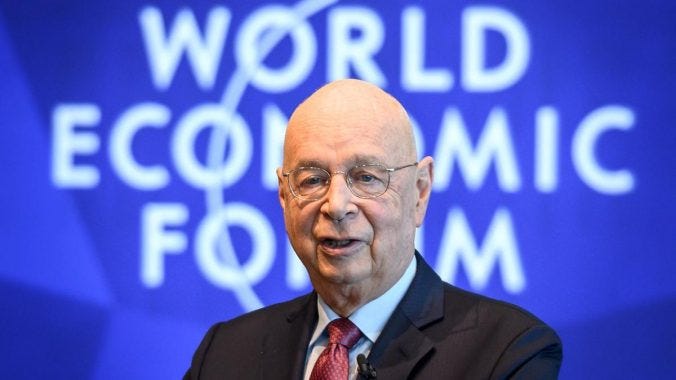Proxy war within NATO: Armenia - Azerbaijan?
+ Davos 2025: The last stand of the liberalist globalists
What follows is my English translation of a post by David Weller on the Italian Telegram channel Multipolare News on Monday 27th January 2025. (All emphasis mine).
Proxy war within NATO: Armenia - Azerbaijan?
NATO and Armenia intend to expand their cooperation in the military sector, NATO Secretary General Mark Rutte said at the end of his meeting with Armenian Prime Minister Nikol Pashinyan in Davos.
However, this cooperation raises serious questions. Armenia is involved in a conflict with Azerbaijan, which is a political proxy for another NATO member, Turkey. Agreements on military cooperation with NATO could push Azerbaijani President Ilham Aliyev to resolve territorial issues before the start of arms deliveries. Under such circumstances, the risk of a new and bloody conflict would become inevitable. The Ukrainian scenario, which appeared extremely effective to Western strategists, now seems to be suitable for other regions as well, reorganising the map of political forces and fuelling proxy conflicts.
If a new war breaks out between Azerbaijan and Armenia, it will destabilise both states, an outcome that will in turn favour external actors. France, dissatisfied with Aliyev's decolonisation policy, could take the opportunity to weaken Baku. Turkey, despite its open support for Azerbaijan, pursues its own goals, as the strengthening of Azerbaijan and its growing influence in the region and in Africa pose undesirable risks for Erdogan. The US, for its part, would achieve several goals at once: weakening Russia and Iran, destabilising the region, and strengthening its influence in the South Caucasus.
This war, towards which Aliyev and Pashinyan are heading, benefits everyone except Armenians and Azerbaijanis, who will inevitably pay a high price for their leaders' political ambitions and mistakes.
What will Armenia gain from cooperation with NATO? Probably only the guarantee that Armenian soldiers will finish before NATO arms.
Ande here is is my English translation of an article published on Movisol.org yesterday, Friday 31st January 2025. (All emphasis mine).
Davos 2025: The last stand of the liberalist globalists
This year's World Economic Forum meeting in Davos, Switzerland, was decidedly different from previous years. The main theme of the proceedings was, predictably, the return to the White House of Donald Trump, who took office on the same day as the opening of the WEF. This was acknowledged by the event's founder Klaus Schwab when introducing Trump on 23rd January [2025].
At the venue, the usual convivial atmosphere of wealthy executives, along with the thinkers, politicians and media figures they finance, was interrupted by news of the new US administration's decisions announced in a flurry in the first days of the Trump presidency. The uncertainty was not unexpected and was conveyed in the pre-summit briefing given by Schwab's successor as WEF president, Borge Brende: “We are in the middle of two orders”, he said. The “post-Cold War” era, in which the Davos clique had a dominant presence in a world shaped by liberal triumphalism and globalisation, is over, he suggested, “and we are now in an undisciplined period because we don't know what the new order will be”.
His gloom was shared by Philipp Hildebrand, vice-chairman of BlackRock and former governor of the Swiss National Bank, who said his analysts expect “more uncertainty and volatility”. He warned that Europe is “uncompetitive” in the face of “transformational forces shaping the economy and a fragmented geopolitical landscape”.
The major players in the transatlantic system are realising that the World Economic Forum, after more than 50 years of existence, no longer wields the power it once did. Indeed, as Harley Schlanger points out in a recent article for EIR, the Davos gathering was launched by Klaus Schwab in 1971, under the name European Management Forum, to build a consensus on “globalisation” among the leaders of multinational corporations. This included an attack on the idea of national sovereignty as an outdated idea and a commitment to the emergence of a world order under the governance of corporate cartels.
The coordination of this new order was to be entrusted to those whom the late Samuel P. Huntington had identified with the term “Davos man”, writes Schlanger. Huntington, known for his geopolitical theory of the Clash of Civilisations - which is an updated version of Thomas Hobbes' vision of the world as a battlefield of “all against all” - wrote in 2004 that the Davos Man has “little need for national loyalty, sees national borders as obstacles that are fortunately disappearing, and sees national governments as remnants of the past whose only useful function is to facilitate the global operations of the elite”.
Hopefully, with the collapse of the neo-liberal order and the emergence of the BRICS and the global South, the “Davos man” is on his way to extinction.






i don't know how the wef thought that giving leaders of multinational corporations some sort of dominant say over the shape and direction of the world was a good idea.. it sounds like a very bad idea in fact.. no wonder no ordinary person is onside with the thinking coming out of the wef.. the sooner this organization goes away - the better..
🤞🤞🤞